

Design for Open Systems, Processes, Projects, Places. The Effects of the Open Source Movement on the Development of Politics and Society. Knowledge Is a Common Good By Marco Berlinguer In October 2009, Transform!
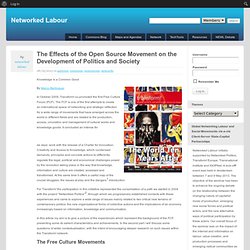
Co-promoted the first Free Culture Forum (FCF). The FCF is one of the first attempts to create an international space of networking and strategic reflection for a wide range of movements that have emerged across the world in different fields and are related to the production, access, circulation and management of cultural works and knowledge goods. It concluded an intense thr ee days’ work with the release of a Charter for Innovation, Creativity and Access to Knowledge, which condensed demands, principles and concrete actions to differently regulate the legal, political and economical challenges posed by the revolution taking place in the way that knowledge, information and culture are created, accessed and transformed.
For Transform! In this article my aim is to give a picture of the experiences which represent the background of the FCF, presenting some its salient characteristics and achievements. Conclusion Notes. Seed Factories. Xania has nominated himself for use of the Checkuser tools.
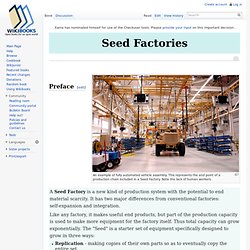
Please provide your input on this important decision. From Wikibooks, open books for an open world An example of fully automated vehicle assembly. New Work Centers and HTSP. A few days ago I gave a keynote address to the International Society for Ecological Economics which was held in Bremen, Germany.
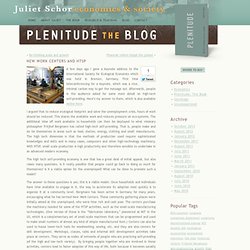
First time teleconferencing for a keynote, which was a nice, minimal carbon way to get the message out. Afterwards, people in the audience asked for some more detail on high-tech self-providing. Here’s my answer to them, which is also available online here. I argued that to reduce ecological footprint and solve the unemployment crisis, hours of work should be reduced. This shares the available work and reduces pressure on eco-systems.
The high tech self-providing economy is one that has a great deal of initial appeal, but also raises many questions. The answer to these questions is yes, this is a viable model. In coming years, the economics of HTSP are likely to improve, for two reasons. The New Glocal Economy. Over the past few years, it seems like people have been feeling pulled in all directions.
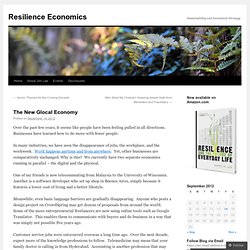
Businesses have learned how to do more with fewer people. In many industries, we have seen the disappearance of jobs, the workplace, and the workweek. Work happens anytime and from anywhere. Yet, other businesses are comparatively unchanged. Why is this? One of my friends is now telecommuting from Malaysia to the University of Wisconsin. Meanwhile, even basic language barriers are gradually disappearing. Customer service jobs were outsourced overseas a long time ago. While the digital economy has been going global, there are signs that the physical economy will become more localized over the coming decade. Let’s take a look at a few reasons why this might be happening: Cost. Shipping from Asia made more sense when gasoline was cheaper than bottled water.
Michel Bauwens on P2P Production and the Coming of the Commons. Video via Presentation in Helsinki on 28.9.2012 Unedited draft by Jean Lievens: Michel: “I’d like to start with some examples, because otherwise some people will think well, it is theory; maybe in thirty years something like that (will happen)… so I‘ll start with two examples.

This one I like, it’s almost a P2P-exemple by the book as it were. Some examples The Nutrient Dense project This is a community of people who have this very strange idea that if you put good nutrients in the soil, you will get better food. Wikispeed The other example I’d like to show is Wikispeed. Okay, let’s take a historical analogy: industrial capitalism, mass consumer based capitalism, was actually born when Henry Ford used Taylorist assemble lines, so you put different things together. So if you know anything about history, this happened before, right? Bitcoin I think this is a good example to show how these different things fit together.
Phase Transition. 43 Essential essays on the commons and Peer 2 Peer theory. This list is from the great P2P foundation website, which has loads of great articles and information on Peer 2 Peer (P2P) theory.
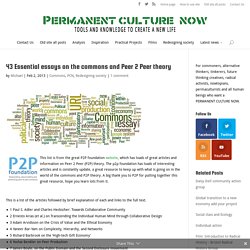
The p2p foundation has loads of interesting articles and is constantly update, a great resource to keep up with what is going on in the world of the commons and P2P theory. A big thank you to P2P for putting together this great resource, hope you learn lots from it. This is a list of the articles followed by brief explanation of each and links to the full text. 1 Paul S. Paul S. Essay: Paul S. URL = Peer-to-Peer Learning Handbook. Self-Repair Manifesto. Cdn.makezine.com/make/MAKERS_RIGHTS.pdf. Does peer production represent a radical break with capitalism? “While practically and empirically the P2P mode of production is still under the sway of capitalism and to a great extent dependent on it (buying computers and other materials and services from it and using its infrastructure), its logic radically contradicts that of capital.
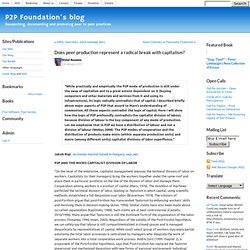
I described briefly above major aspects of P2P that accord to Marx’s understanding of communism.